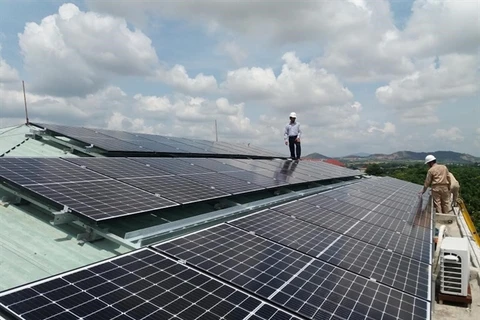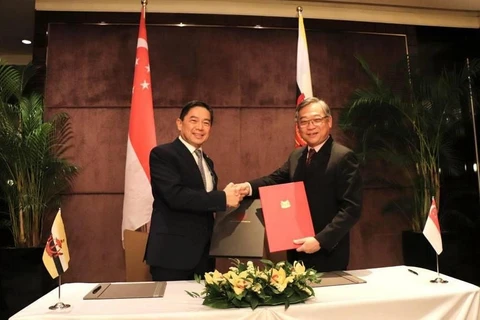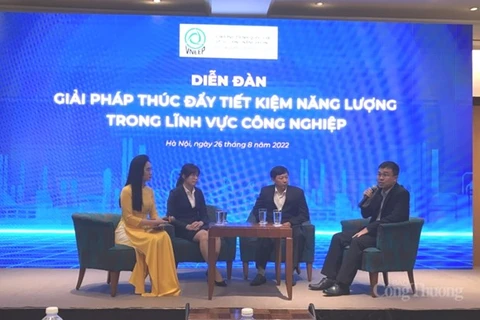Hanoi (VNS/VNA) - The absence of laws on energy and in particular renewable energy is causing an imbalance between the stages of production, transmission and consumption of coal-fired power, solar power, and wind power in Vietnam.
Experts mentioned this shortcoming at a recent event within the framework of the Energy Support Program (ESP), a cooperation between the Ministry of Industry and Trade and the International Cooperation Organization.
According to World Bank data, Vietnam currently leads installed solar power capacity in Southeast Asia, increasing from 86 MW in 2018 to 16,500 MW in 2020, putting Vietnam in the top ten countries of installed solar capacity in the world.
While the development of solar power has contributed to supplementing an important source of electricity that helps ensure the national power system, its uncertain nature and rapid development in a short time have caused difficulties.
Under the Politburo's Resolution 55, the development of a smart grid was to ensure the reliability and security of the national energy supply and help achieve the goals in Vietnam's 10-year socio-economic development strategy for the period of 2021-2030.
Head of Renewable Energy Component (GIZ) Vu Chi Mai said grid infrastructure in Vietnam has not yet developed rapidly, leading to limitations that prevent organisations from maximising the renewable energy economy.
He said: “We need smart grid projects to develop modern, balanced energy infrastructure compared to other countries in ASEAN.”
At the meeting, the senior officer of the Smart Grid Project for Renewable Energy and Energy Efficiency (SGREEE), said: “The smart grid system has a two-way exchange method, allowing electricity to be exchanged and bidirectional information between utilities and consumers, which can be integrated at scale. Since then, the development of renewable energy forms becomes efficient, safe and sustainable.
He added: "From 2022, Vietnam's smart grid is expected to apply Internet of Things technology to bring about energy efficiency, helping Vietnam to reach the above goals."
After five years of implementing the smart grid project, achievements include the completion of the legal framework, capacity building and development, and domestic and foreign technology cooperation.
The highlight is the promotion of electricity load adjustment by designing and researching the CPP tariff - an hourly price increase, in accordance with the characteristics of Vietnam.
GIZ experts proposed a set of criteria for Vietnam Electricity (EVN) and the Ministry of Industry and Trade to build a smart grid index and apply it to power corporations.
At the same time, experts considered coal power as difficult-to-access capital.
Mai said: “Until now, as Vietnam has mainly focused on stabilising coal power, the requirement is how to ensure input materials have stability. We are used to using stored energy, but the nature of the reserve is that it will run out when used up, but when moving to renewable energy, a cycle is formed.
A senior officer of the Renewable Energy and Energy Efficiency Project Nguyen Anh Dung said that the carbon tax will directly affect the competitiveness of the energy companies.
He said: “Of particular significance is the commitment of 47 per cent of insurance companies in the world will not issue reinsurance for coal-fired power. Without insurance, there will be no capital, forcing companies to change their energy sources."
Dung said Prime Minister Pham Minh Chinh’s commitment at COP26 became the driving force and determination to promote Vietnam's rapid transformation of sustainable energy towards a combination of policies to increase the localization rate, adding: "Currently, the price of renewable energy is cheaper and more competitive than before. Developing countries need to find their own path."
Duong Manh Cuong said: "Vietnam still lacks two important laws, known as the Law on Energy and the Law on Renewable Energy, which leads to the unreasonable state of management policies for the development of the electricity industry between coal-fired, solar and wind power.”
He said there was still a big gap between the energy that "needs" to be mobilised and the energy that "can" be mobilised, leading to phase differences between production and transmission stages. and electricity consumption."
GIZ experts recommended that the Ministry of Industry and Trade and the Government of Vietnam review and propose to update the roadmap for developing smart grids combined with smart grid indexes. The organisation proposed a set of criteria for Vietnam Electricity (EVN) and the Ministry of Industry and Trade to build a smart grid index and apply it to power corporations.
The set of criteria provides eight criteria; green energy, energy market, supply reliability, data analysis, monitoring and control, customer satisfaction, network security and integration./.
Experts mentioned this shortcoming at a recent event within the framework of the Energy Support Program (ESP), a cooperation between the Ministry of Industry and Trade and the International Cooperation Organization.
According to World Bank data, Vietnam currently leads installed solar power capacity in Southeast Asia, increasing from 86 MW in 2018 to 16,500 MW in 2020, putting Vietnam in the top ten countries of installed solar capacity in the world.
While the development of solar power has contributed to supplementing an important source of electricity that helps ensure the national power system, its uncertain nature and rapid development in a short time have caused difficulties.
Under the Politburo's Resolution 55, the development of a smart grid was to ensure the reliability and security of the national energy supply and help achieve the goals in Vietnam's 10-year socio-economic development strategy for the period of 2021-2030.
Head of Renewable Energy Component (GIZ) Vu Chi Mai said grid infrastructure in Vietnam has not yet developed rapidly, leading to limitations that prevent organisations from maximising the renewable energy economy.
He said: “We need smart grid projects to develop modern, balanced energy infrastructure compared to other countries in ASEAN.”
At the meeting, the senior officer of the Smart Grid Project for Renewable Energy and Energy Efficiency (SGREEE), said: “The smart grid system has a two-way exchange method, allowing electricity to be exchanged and bidirectional information between utilities and consumers, which can be integrated at scale. Since then, the development of renewable energy forms becomes efficient, safe and sustainable.
He added: "From 2022, Vietnam's smart grid is expected to apply Internet of Things technology to bring about energy efficiency, helping Vietnam to reach the above goals."
After five years of implementing the smart grid project, achievements include the completion of the legal framework, capacity building and development, and domestic and foreign technology cooperation.
The highlight is the promotion of electricity load adjustment by designing and researching the CPP tariff - an hourly price increase, in accordance with the characteristics of Vietnam.
GIZ experts proposed a set of criteria for Vietnam Electricity (EVN) and the Ministry of Industry and Trade to build a smart grid index and apply it to power corporations.
At the same time, experts considered coal power as difficult-to-access capital.
Mai said: “Until now, as Vietnam has mainly focused on stabilising coal power, the requirement is how to ensure input materials have stability. We are used to using stored energy, but the nature of the reserve is that it will run out when used up, but when moving to renewable energy, a cycle is formed.
A senior officer of the Renewable Energy and Energy Efficiency Project Nguyen Anh Dung said that the carbon tax will directly affect the competitiveness of the energy companies.
He said: “Of particular significance is the commitment of 47 per cent of insurance companies in the world will not issue reinsurance for coal-fired power. Without insurance, there will be no capital, forcing companies to change their energy sources."
Dung said Prime Minister Pham Minh Chinh’s commitment at COP26 became the driving force and determination to promote Vietnam's rapid transformation of sustainable energy towards a combination of policies to increase the localization rate, adding: "Currently, the price of renewable energy is cheaper and more competitive than before. Developing countries need to find their own path."
Duong Manh Cuong said: "Vietnam still lacks two important laws, known as the Law on Energy and the Law on Renewable Energy, which leads to the unreasonable state of management policies for the development of the electricity industry between coal-fired, solar and wind power.”
He said there was still a big gap between the energy that "needs" to be mobilised and the energy that "can" be mobilised, leading to phase differences between production and transmission stages. and electricity consumption."
GIZ experts recommended that the Ministry of Industry and Trade and the Government of Vietnam review and propose to update the roadmap for developing smart grids combined with smart grid indexes. The organisation proposed a set of criteria for Vietnam Electricity (EVN) and the Ministry of Industry and Trade to build a smart grid index and apply it to power corporations.
The set of criteria provides eight criteria; green energy, energy market, supply reliability, data analysis, monitoring and control, customer satisfaction, network security and integration./.
VNA























